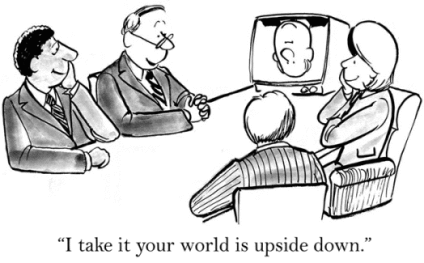The Daily Standup

In Liz Hayes’s post about routine check-ins, seemingly simple collaboration processes and trust enable hard-working, distributed teams to succeed. —Editor
Author: Liz Hayes
I joined a new project last summer, a Global Information System (GIS) effort run by Keith W. Miller. The team is made up of about seven database experts and Python developers who do data visualization for our sponsor. We have a daily standup meeting. Every morning, we get together either in person or by phone. Some dial in from home or from the road, and one connects from Bedford. (There’s a spoof, “A Conference Call in Real Life”, in which people around a conference table speak while muted or attempt to quiet a barking dog. That video is our theme song.) The standup lasts fifteen minutes. Each person says what they did yesterday, what they’re going to do today, and what obstacles lie in the way.
I usually work with little supervision, so I felt doubtful at first about checking in every day. But the standup isn’t about micro-management, it’s about collaboration. Keith usually goes first, setting the example and leading from the front. The fact that he participates as an equal rather than an overseer is extremely important to the way the standup functions. There’s a lot of trust among team members, I think because we get together every day.
In the first standup I attended, one of the senior developers said, “for obstacles, the main barrier is that I don’t know what I’m doing.” Now, if I were standing in front of a group of people I didn’t see very often, and wanted to impress, I would’ve said, “No problems, everything is proceeding on schedule,” assuming the problems I had were the usual small, normal ones. But at the standup, I feel free to admit, “My path variable doesn’t work. It should work, but it doesn’t.” And someone else will say, “I had that problem yesterday, and here’s how I fixed it.” And that five-minute conversation will save me a whole day of trying to track down the problem.
One measure of trust is how much we tease each other. Once I addressed John White, a semantic linguist, as Jon Snow. He said, “I don’t even know who that is.” “Good, because you died a horrible death in the last season,” said someone else on the team.
I think it works, even with all the teleconferencing, because we all know each other in person. The combination of the tone Keith sets, combined with the daily contact in the hallway conversations about hobbies and other important events in our lives cements the trust that makes the standup meetings work.
© 2016 The MITRE Corporation. All rights reserved. Approved for public release; Distribution unlimited. Case Number 16-0344

0 Comments